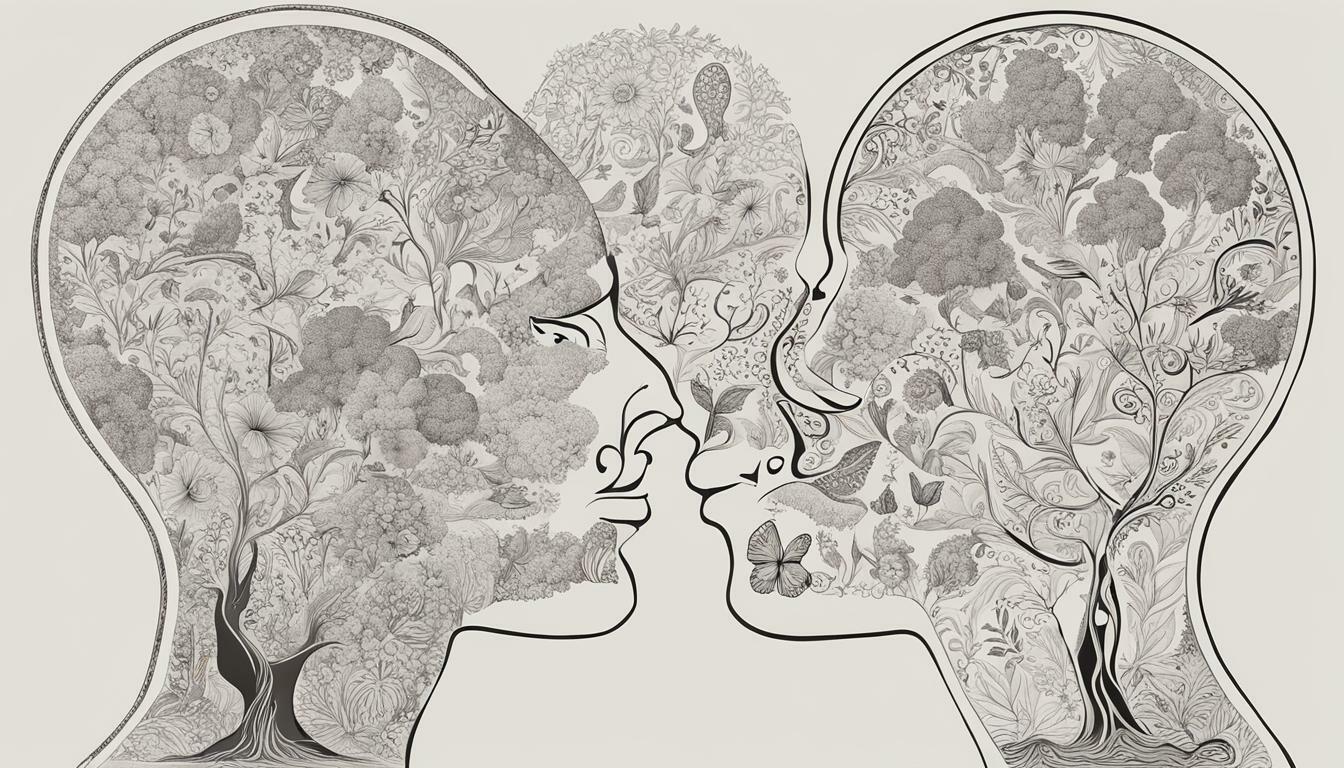Empathy, the ability to understand and share the feelings of others, plays a critical role in our lives and relationships. However, its opposite, the lack of empathy, is a complex and often misunderstood phenomenon that can have profound consequences.
In this article, I will provide a deep dive into the opposite of empathy and explore its various implications, causes, and potential solutions. Whether you struggle with empathy deficits yourself or have relationships with people who lack empathy, this article will help you better understand and navigate this challenging issue.
Key Takeaways:
- The opposite of empathy refers to a lack of the ability to understand and share the feelings of others.
- This article will explore the impact of empathy deficits on personal relationships, common signs of lacking empathy, potential causes, and strategies for addressing the issue.
- Understanding and addressing the opposite of empathy is critical for maintaining healthy relationships and promoting a more empathetic society.
Defining The Opposite of Empathy
Before we can understand the impact of lacking empathy, we first need to define what it means. The opposite of empathy is characterized by a deficiency, absence, or complete lack of empathy. This means that the individual is unable to feel and understand the emotions of others, leading to a noticeable lack of compassion and concern for others.
Empathy deficiency is not just an inability to connect emotionally with others, but also a failure to acknowledge the experiences and perspectives of others. It can manifest in various ways, from difficulty reading social cues to a lack of interest in others.
People with empathy deficits may not necessarily be cruel or intentionally hurtful, but they may come across as cold, aloof, or insensitive. Their emotional detachment can make it difficult for them to form meaningful connections with others, which can also affect their personal and professional relationships.
Impact on Relationships
Not being able to empathize with others can have a significant impact on personal relationships and social interactions. While it’s easy to overlook the importance of empathy in day-to-day life, it’s actually a crucial component of healthy relationships. When empathy is negated, a relationship can quickly turn toxic. Those who lack empathy may struggle with connecting emotionally with others, making it difficult to establish meaningful connections.
People with an empathy void might avoid intimacy or isolate themselves in an attempt to prevent themselves from being vulnerable or hurt. This can leave a partner feeling neglected or unimportant in the relationship, leading to feelings of resentment and frustration. Even minor disagreements can be difficult to resolve when one partner is unable to see the other’s perspective or validate their feelings.
In social settings, individuals with an absence of empathy may struggle to read social cues or interact with others appropriately, causing them to come across as cold or unapproachable. This can lead to difficulty forming friendships or establishing a sense of community.
Recognizing Anti-Empathy Behaviors
It can be difficult to identify individuals who lack empathy, as they may exhibit a range of behaviors that can be mistaken for other personality traits. However, there are some common signs that may indicate a person is suppressing their empathy or lacking it altogether.
Anti-Empathy Behaviors
Some common behaviors associated with the opposite of empathy include:
- Disregard for other people’s feelings and perspectives
- Lack of remorse or guilt for causing harm to others
- Difficulty understanding and relating to others’ emotions
- Frequent interrupting or talking over others
- Defensiveness and inability to take feedback
Empathy Suppression
Individuals who suppress their empathy may do so for various reasons, including past traumas or fear of vulnerability. They may appear cold and distant, or seem to lack emotional expression. It’s important to understand that suppressing empathy is not the same as lacking it altogether, and that with proper support and therapy, individuals can learn to access and express their empathy more easily.
“It’s important to understand that suppressing empathy is not the same as lacking it altogether.”
Recognizing anti-empathy behaviors can help individuals learn to navigate relationships with those who lack empathy. By identifying these behaviors, we can learn to set healthy boundaries, communicate our needs effectively, and avoid potentially harmful situations. It’s also important to remember that individuals who lack empathy may still be capable of change and growth with the right support and intervention.
Origins and Causes of Empathy Deficit
Understanding the root of empathy deprivation is crucial in addressing the issue. There are various reasons why some people struggle to empathize with others, ranging from psychological to societal factors. One potential cause of lacking empathy is a history of abuse or trauma, which may lead individuals to dissociate from their emotions to cope with the pain. Additionally, some people may have genetic predispositions that make it harder for them to understand and connect with others emotionally.
Environmental factors can also contribute to empathy deprivation. For instance, growing up in a household where emotions were not expressed or acknowledged may lead someone to struggle with identifying and relating to others’ feelings. Cultural norms can also play a role in shaping empathy. In societies that prioritize individualism over collectivism, for example, people may be less likely to prioritize others’ needs over their own.
The societal impact of empathy deprivation cannot be overlooked. Factors such as poverty, racism, and discrimination can contribute to a lack of empathy towards certain groups of people, perpetuating harmful stereotypes and diminishing human connection. Addressing these larger structural issues is crucial in promoting empathy at a broader societal level.
The Emotional Impact of Empathy Deficit
As someone who struggles with empathy deficits, I am aware of how challenging it can be to navigate personal relationships. Not only does lacking empathy make it hard to understand others’ feelings, but it can also impact the way we perceive and experience emotions ourselves.
Feeling empathy deprivation can often lead to a sense of isolation and disconnection from those around us. The absence of empathy can make it challenging to understand and connect with others, leading to a lack of trust and difficulty establishing close relationships.
However, it’s important to note that empathy deprivation doesn’t necessarily mean we are incapable of experiencing emotions. Many individuals with this condition still feel emotions deeply but may struggle with expressing them or recognizing them in others.
Living with empathy deficits can be a frustrating experience, and it’s essential to acknowledge the emotional toll it can take on our mental health. Seeking professional help can be a crucial step in managing the emotional challenges of empathy deprivation.
Despite the difficulties of empathy depletion, there are ways to cultivate empathy and build stronger relationships with those around us. By being intentional about our interactions with others and focusing on active listening, we can start to develop a better understanding of others’ feelings and perspectives.
Overall, lacking empathy can be a challenging experience, but it’s essential to remember that emotional growth and change are possible. By seeking support when needed and taking steps to cultivate empathy, we can build stronger, more empathetic relationships with those around us.
Navigating Relationships with Empathy Deficit
Dealing with someone who lacks empathy can be challenging, but it is possible to maintain healthy relationships with some effort and understanding. Here are some strategies:
Don’t Take It Personally
If someone lacks empathy, they may not react to situations in the same way as you, and this can lead to misunderstandings. Try not to take their behavior personally and understand that it’s not a reflection of you.
Communicate Clearly and Directly
When communicating with someone who lacks empathy, it’s essential to be clear and direct with your words. Avoid using subtext or hints, and instead, use straightforward language to express your feelings and needs.
Set Boundaries
It’s okay to set boundaries with someone who lacks empathy, especially if they’re causing emotional distress. Communicate your boundaries clearly, and enforce them firmly if necessary.
Practice Self-Care
If you’re in a relationship with someone who lacks empathy, it’s essential to take care of yourself emotionally. Spend time with people who support you, engage in activities that make you happy, and prioritize your well-being.
In conclusion, empathy negation, empathy void, and empathy avoidance can impact relationships significantly. However, by communicating clearly, setting boundaries, and practicing self-care, it’s possible to navigate relationships with someone who lacks empathy.
Seeking Professional Help
It can be challenging to navigate life and maintain healthy relationships when struggling with empathy deprivation or suppression. Seeking professional help can be a useful option for those who find that their empathy deficit significantly impacts their life and relationships. Therapy or counseling can help individuals better understand and manage their emotions, build empathy skills, and cultivate healthy relationships.
It is essential to find a mental health professional who has experience in working with individuals struggling with empathy-related issues. They can provide tailored guidance and support to help individuals navigate their specific challenges.
Remember, seeking professional help is not a sign of weakness. It is a courageous step towards taking control of one’s life and well-being.
Cultivating Empathy in a World Lacking It
As I explored in previous sections, the opposite of empathy, or lacking empathy altogether, can have severe consequences on personal relationships and society as a whole. It’s no secret that we live in a world that sometimes seems to be devoid of empathy, where people avoid understanding and acknowledging the feelings and experiences of others.
But what can we do to cultivate empathy in this world, both individually and as a society?
- Practice Active Listening: When someone is speaking to you, make a conscious effort to listen to their words, understand their perspective, and respond appropriately. Avoid interrupting them or trying to change the subject. Active listening helps build mutual understanding and trust, which are essential components of empathy.
- Seek Out Different Perspectives: Living in a bubble of our own experiences and beliefs can hinder our ability to empathize with others who have different backgrounds and experiences. Seek out opportunities to learn from diverse perspectives by reading books, watching documentaries, or engaging in conversations with people who have different viewpoints than your own.
- Practice Empathy in Daily Interactions: Small acts of kindness can go a long way in cultivating empathy. Hold the door open for someone, help a stranger carry their groceries, or simply smile at someone passing by. These small acts of kindness can help create a ripple effect in the world and inspire others to do the same.
It’s important to note that empathy is not something that can be forced or faked. It’s a skill that requires conscious effort and practice to develop, and it’s a lifelong process.
“Empathy is not something that can be forced or faked. It’s a skill that requires conscious effort and practice to develop, and it’s a lifelong process.”
As a society, we can also take steps to cultivate empathy on a broader scale:
- Include Empathy in Education: Teaching empathy in schools can help children develop the skills and mindset necessary to build strong, supportive relationships with others.
- Encourage Media That Promotes Empathy: The media we consume has a significant impact on our beliefs and behaviors. Encouraging and supporting media that promotes empathy, compassion, and understanding can help create a more empathetic society.
- Address Systemic Issues: A lack of empathy can often be rooted in systemic issues, such as racism, sexism, and other forms of discrimination. Addressing these systemic issues and promoting equality and justice for all can help create a more empathetic and compassionate society.
Cultivating empathy is not an easy task, but it’s a crucial one. By taking small steps in our daily lives and supporting larger efforts to promote empathy on a societal level, we can create a more compassionate and understanding world for ourselves and future generations.
Conclusion
In conclusion, understanding the opposite of empathy is crucial in building meaningful relationships and promoting a compassionate society. Throughout this article, we have explored what it means to lack empathy, the impact it can have on relationships, and the behaviors that indicate a deficit.
We have also delved into the origins and emotional toll of empathy deprivation and provided strategies for navigating relationships with those who lack empathy. Seeking professional help is an important step for anyone struggling with empathy suppression that significantly affects their life and relationships.
Finally, we have discussed ways society can promote empathy and address the broader issue of lacking empathy in our world. It is important to recognize that empathy is not just a personal characteristic but a social and cultural construct that requires ongoing attention and cultivation.
As we move forward, let us strive to cultivate empathy in ourselves and others, recognizing that it is a powerful force for positive change. Thank you for joining me on this deep dive into the opposite of empathy.






